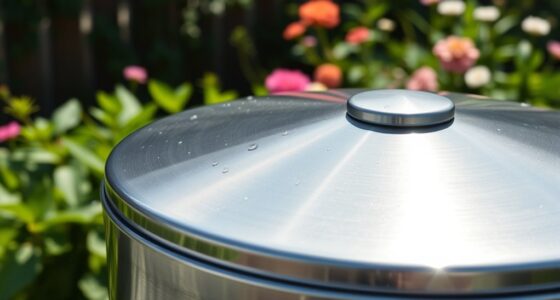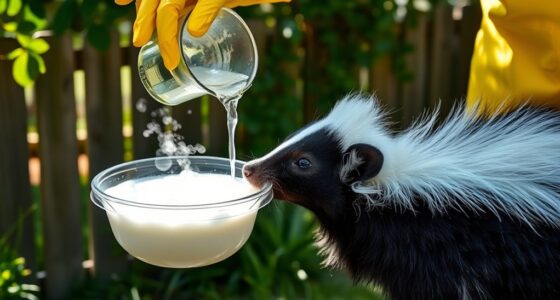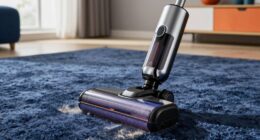I understand that gym bag funk mainly comes from bacteria feeding on sweat and residues trapped in your fabrics. To combat this, I recommend looking for bags with antimicrobial treatments or using antimicrobial sprays to inhibit bacteria growth. Regularly washing your bag with warm water, mild detergent, and natural remedies like vinegar or baking soda can also help. Proper drying, especially in the sun, is key to keeping odors at bay—if you want more tips, keep going.
Key Takeaways
- Antimicrobial fabrics or treatments inhibit bacterial growth, reducing persistent gym bag odors caused by sweat and bacteria.
- Regularly wash gym bags with warm water, mild detergent, and natural deodorizers like vinegar or baking soda to neutralize odors.
- Use gentle cycles and avoid harsh chemicals to preserve antimicrobial treatments and fabric integrity.
- After cleaning, dry bags thoroughly in sunlight or well-ventilated areas to eliminate bacteria and prevent odor buildup.
- Applying antimicrobial sprays or treatments periodically helps maintain freshness and extends the odor-free lifespan of gym bags.

Ever wonder why your gym bag often smells less than fresh even after a quick wash? It’s frustrating, isn’t it? That persistent gym bag funk isn’t just about dirt; it’s primarily caused by sweat odor trapped deep within the fabric. No matter how many times you toss it into the wash, some odors linger because typical laundry cycles don’t always target the microscopic bacteria that cause the smell. That’s where fabric treatment comes into play. Using specialized sprays or washes designed for gym gear can make a huge difference. These treatments help break down the bacteria and sweat residue that cling stubbornly to the fabric fibers, reducing odor buildup over time. It’s a game-changer, especially if you’re tired of that stale smell invading your gym routine.
One of the best ways to combat gym bag funk is to pay attention to the materials your bag is made of. Many modern gym bags incorporate antimicrobial fabrics or treatments that inhibit bacterial growth. These fabrics actively fight the bacteria responsible for sweat odor, making it harder for that smell to develop in the first place. If your bag doesn’t have this feature, don’t worry—applying an antimicrobial spray designed for fabrics can mimic this effect. Regularly treating your gym bag with such products can substantially extend the freshness, preventing the bacteria from thriving and causing that infamous smell.
When it comes to washing tips, I’ve learned that a simple rinse isn’t enough for gym gear. Always empty your bag after each workout, and give it a good shake to remove loose debris. Then, wash it with warm water and a mild detergent, but consider adding a cup of white vinegar or baking soda to help neutralize odors. These natural remedies work wonders on sweat odor, breaking down the compounds that cause that pungent smell. For fabrics with antimicrobial treatment, check the manufacturer’s instructions—some can be washed more frequently without diminishing their effectiveness. If your bag is machine washable, use a gentle cycle to prevent damaging the fabric, and avoid harsh chemicals that might strip away any fabric treatments.
Drying your bag properly is equally important. Avoid leaving it damp for too long, as moisture fosters bacteria growth. Instead, hang it in a well-ventilated area, preferably in sunlight. The UV rays help kill bacteria and refresh the fabric naturally. Regular maintenance, combined with the right fabric treatment and proper washing, will keep your gym bag smelling fresh and ready for your next workout. Trust me, a little extra effort goes a long way in banishing that lingering gym bag funk.
Frequently Asked Questions
How Long Do Antimicrobial Fabrics Retain Their Effectiveness?
Antimicrobial fabrics typically retain their microbial resistance for about 20 to 50 washes, depending on usage and care. I’ve found that proper washing and avoiding harsh detergents help extend their fabric longevity. After several washes, antimicrobial properties may diminish, so I recommend replacing gear when you notice less odor control or microbial resistance. Regular maintenance guarantees your workout clothes stay fresh and effective longer.
Can Antimicrobial Fabrics Cause Skin Irritation?
If you have fabric allergy or skin sensitivity, antimicrobial fabrics might cause irritation, like in a case where someone developed redness after wearing treated gym shirts. These fabrics can sometimes trigger allergic reactions or irritation in sensitive skin, especially if not properly washed. I recommend checking for any signs of discomfort and washing the garments thoroughly. If irritation persists, it’s best to switch to natural fibers to avoid skin issues.
Are Antimicrobial Fabrics Environmentally Sustainable?
Antimicrobial fabrics aren’t always environmentally sustainable, but there are eco-friendly alternatives out there. I look for options made from natural or biodegradable fibers, which reduce environmental impact. Additionally, fabric recycling options help extend the life of textiles and minimize waste. While antimicrobial treatments can be beneficial, I prefer brands that prioritize sustainability, ensuring my gym gear is both effective and eco-conscious.
Do Antimicrobial Treatments Need Reapplication Over Time?
The short answer is yes, antimicrobial treatments often need reapplication over time. While these fabrics are designed for durability, their antimicrobial longevity can diminish with frequent washes and heavy use. Think of it like a coat of armor wearing thin; to keep your gear fresh and protected, occasional re-treatment is key. Regular washing helps maintain fabric durability, but reapplying antimicrobial agents guarantees your bag stays odor-free and bacteria-resistant in the long run.
Can Washing Too Often Damage Antimicrobial Properties?
Washing too often can indeed damage antimicrobial properties, reducing fabric durability over time. I recommend balancing your washing frequency to keep your gear fresh without compromising its benefits. Gentle cycles and cold water help preserve these treatments, so I avoid over-washing. Trust me, taking care of your antimicrobial fabrics means they stay effective longer, ensuring your workout gear remains odor-free and hygienic without sacrificing its longevity.
Conclusion
To keep my gym bag fresh, I stay vigilant—regularly washing, letting it breathe, and choosing antimicrobial fabrics. I know the power of prevention: preventing odor, preventing bacteria, preventing that stubborn funk from settling in. By caring for my bag, I create a clean space, a fresh start, a scent of victory after every workout. It’s simple habits, but they transform my gym experience, turning chaos into calm and funk into freshness.









